Local
The rest of the year’s top local stories
Md. marriage fight, trans shootings dominate headlines
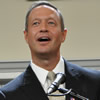
Frank Kameny’s death is our pick for the top local news story of 2011. Here are the rest of the top 10 local news stories of the year.
#2 Md. marriage bill killed, resurrected
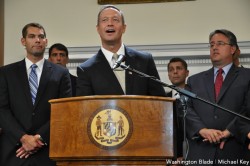
Maryland Gov. Martin O’Malley announced he would sponsor a 2012 bill to legalize same-sex marriage after the measure died in 2011. (Blade photo by Michael Key)
A bill to legalize same-sex marriage in Maryland died in the state legislature in March following a controversial behind-the-scenes decision by supportive lawmakers and leaders of LGBT rights groups to cancel a final vote on the bill on grounds that they lacked enough votes to pass it.
The action to pull the bill took place March 11 when the Maryland House of Delegates approved a motion by voice vote to recommit the bill to committee following an emotional two-and-a-half-hour debate over the measure on the House floor. The withdrawal of the bill came less than a month after the Maryland Senate passed the measure, the Civil Marriage Protection Act, by a vote of 25-21.
A little over a month after the bill’s demise, the board of directors of Equality Maryland, the state LGBT advocacy group that led lobbying efforts for the bill, fired its executive director Morgan Meneses-Sheets. The firing prompted the group’s development director, Matthew Thorn, to resign in protest, worsening the group’s existing financial problems and leading to a major shakeup of the board and staff.
Meanwhile, Maryland Gov. Martin O’Malley, who backed the bill but didn’t aggressively lobby for it, promised later in the year to take a lead role in pushing the measure in the legislature’s 2012 session, which convenes in January. Supporters are hopeful the bill will pass this time around but are uncertain whether it could survive an expected voter referendum.
#3 Rash of anti-trans violence in D.C.
More than a dozen reported violent attacks against transgender women in D.C. in 2011, including two murders, prompted transgender activist Ruby Corado to declare that the transgender community of D.C. was in crisis.
D.C. police, who made arrests in some of the assaults but not for the two murders, said they have no evidence to indicate a single perpetrator is responsible for the attacks.
In August, an unidentified male suspect shot 23-year-old transgender woman Lashai Mclean to death on Dix St., N.E., near the D.C.-Maryland line. Eleven days later a male suspect fired a gun at another transgender woman just a block from where Mclean was killed. The woman was not hit, but police expressed concern that trans women might have been targeted in that area, which is known as a location where transgender prostitutes congregate.
In September, aerospace engineer Gaurav “Gigi” Gopalan, 35, was found dead on a sidewalk in a residential section of the city’s Columbia Heights neighborhood. Most of his friends said he identified as a gay man, but he was dressed in women’s clothes when found unconscious by police, who said the cause of death was blunt force trauma to the head. No suspects have been identified in the case.
The string of attacks and two murders of victims believed to be targeted because of their gender identity prompted at least two protests by trans activists, who called on police to devote more resources to investigate the mostly unsolved cases of anti-trans violence.
#4 Beating of Md. trans woman caught on video

The attack of Chrissy Lee Polis in a Baltimore-area McDonald’s was captured in a video that went viral online. (Blade photo by Michael Key)
The beating of 23-year-old transgender woman Chrissy Lee Polis at a McDonald’s restaurant outside Baltimore in April created a national sensation when a video of the attack went viral over the Internet.
The video, made by a McDonald’s employee, showed two teenage girls punching and kicking Polis as she was sprawled on the floor covering her face and head with her arms. At one point, the video showed one of the female attackers dragging Polis across the floor by her hair.
Polis, who suffered non-life threatening injuries, became a human face for what transgender activists say is the longstanding prejudice, misunderstanding and hate-related violence experienced by the transgender community. Public officials, including Maryland Gov. Martin O’Malley, promised in the wake of the Polis attack to redouble efforts to pass a transgender non-discrimination bill in the Maryland Legislature in 2012.
The two women who attacked Polis, a 19-year-old and a 14-year-old, pleaded guilty to assault and hate crime charges. The 19-year-old was sentenced to five years in prison. Authorities said the 14-year-old was given an undisclosed sentence in the state’s juvenile justice system.
PHOTO: Adam Ebbin
CAPTION: Notoriously anti-gay Virginia elected its first openly gay state senator, Adam Ebbin, who has served in the House of Delegates since 2004.
#5 Adam Ebbin elected first gay Va. state senator
Gay Democrat Adam Ebbin, who has served in the Virginia House of Delegates since 2004, won election in November to the Virginia Senate, becoming the state’s first openly gay senator.
Ebbin defeated Republican challenger and political newcomer Timothy McGhee by a margin of 64 percent to 35 percent. He ran in a district in Northern Virginia with a solid Democratic majority that includes parts of the City of Alexandria and Arlington and Fairfax Counties.
He emerged as an outspoken advocate for LGBT equality during his tenure as the state’s only out gay member of the House of Delegates. He said one of his top priorities in the Senate will be to push legislation to ban job discrimination against state government employees based on their sexual orientation or gender identity.
“I am honored by the trust the voters have shown in me,” Ebbin said following his election to the Senate. “During the campaign I listened to the voters’ concerns and will work on behalf of the values we all share: improving our public schools, expanding our transit system and cleaning up Virginia’s environment.”
#6 Ganymede, D.C. Cowboys, Apex say goodbye
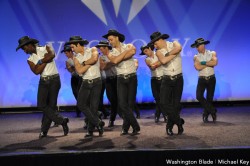
The D.C. Cowboys announced it would disband after 18 years of memorable performances on local, national and even international stages. (Blade photo by Michael Key)
Two popular gay arts and entertainment groups announced plans in 2011 to disband and a third venue, the Dupont Circle gay nightclub Apex, closed its doors for good in July.
Ganymede Arts, D.C.’s only gay-specific theater and arts company, announced in April it was closing after a four-year run that included Broadway-style productions of shows such as “Naked Boys Singing” and “Falsettos.”
Members of the company’s board, including director Jeffrey Johnson, cited financial difficulties as the main reason for their decision to close the company.
“Artistically it’s always been very successful,” Johnson said. “But there’s never been anything left over after each production.”
The D.C. Cowboys, a local dance troupe for gay men, also announced its closing, in this case in 2012, after 18 years of performances at clubs, gay rodeos, and the city’s annual LGBT Pride parade and festival.
The group, which some considered a gay Chippendale troupe geared to country-western music, has been praised for the dance talent of its members who sometimes perform bare-chested.
Apex surprised many of its loyal customers when it closed in July without advance notice. Owner Glen Thompson, who also owns the nearby gay bar Omega, sold Apex to Alan Carroll, the owner of the D.C. gay clubs Ziegfelds-Secrets and the lesbian club Phase One. Carroll said he plans to open a new club in the Apex building at 22nd and P St., N.W., that will cater to a mostly lesbian clientele.
#7 New Md. trans group forms after bill dies
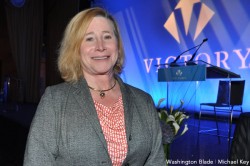
Transgender advocate Dana Beyer co-founded the group Gender Rights Maryland in 2011. (Blade photo by Michael Key)
A transgender non-discrimination bill died in the Maryland Legislature in April after the State Senate startled supporters by voting 27 to 20 to send the Gender Identity Non-Discrimination Act back to committee.
LGBT advocates lobbying for the bill, including officials with the state LGBT group Equality Maryland, said at least seven Democratic senators who promised to vote for the bill changed their positions and indicated they would vote no if the measure came up for a vote.
The Senate action came one month after the House of Delegates voted 86 to 52 to approve a compromise version of the bill that included protections against discrimination in employment and housing but did not include a prohibition against public accommodations discrimination. Supporters of the bill in the House, including its lead sponsor, said they didn’t have the votes needed to pass the bill if it included a public accommodations provision, which would cover public bathrooms and locker rooms in facilities such as health clubs and gyms.
The bill’s demise prompted transgender activists in the state to launch Gender Rights Maryland, the state’s first statewide transgender advocacy organization. Transgender activist Dana Beyer of Montgomery County, one of the group’s co-founders, said Gender Rights Maryland would coordinate efforts to pass a transgender rights bill in the legislature’s 2012 session.
#8 Delaware approves civil unions
The Delaware Legislature in April approved a civil unions bill that provides same-sex couples with all of the rights and benefits of marriage under Delaware law.
The measure cleared the Delaware House of Representatives by a vote of 26-15 and cleared the State Senate by a vote of 13-6. Gov. Jack Markell, a Democrat, signed the bill.
Lisa Goodman, president of the board of Equality Delaware, a statewide LGBT group coordinating lobbying efforts for the bill, said the group and other LGBT organizations and advocates determined they didn’t have the political support in the state to pass a same-sex marriage bill.
Goodman, an attorney, said the civil unions law would provide same-sex couples and their families, including children, with crucial legal protections that they would not have without the civil unions measure.
#9 Local groups celebrate milestones
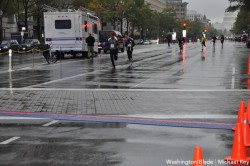
D.C.’s AIDS Walk, organized by Whitman-Walker Health, turned 25 in 2011. (Blade photo by Michael Key)
The D.C. Gay and Lesbian Activists Alliance, the city’s oldest continuously operating LGBT rights group, celebrated its 40th anniversary in 2011.
And Whitman-Walker Health, the city’s largest private clinic treating people with HIV and AIDS, organized its 25th annual Washington AIDS Walk, the group’s main fundraising event.
Nov. 15 marked the 50th anniversary of the founding by the Mattachine Society of Washington, the city’s first gay rights advocacy organization. That milestone became less of a celebration than had been expected due to the death a few weeks earlier of Frank Kameny, the group’s co-founder and leader.
Mattachine Society of Washington ceased operating as an organization in the early 1970s, when Kameny and other leaders of the group shifted their efforts to the then newly formed Gay Activists Alliance, which later became the Gay and Lesbian Activists Alliance. But activists familiar with the city’s gay movement history say Mattachine Society of Washington left an important legacy as a groundbreaking gay advocacy group.
#10 Wone case settlement
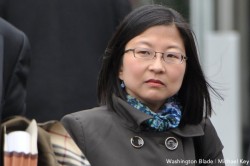
Robert Wone was murdered in 2006. His widow, Kathy Wone, pursued a wrongful death lawsuit against three gay men in connection with the case. (Blade photo by Michael Key)
Three gay men named as defendants in a $20 million wrongful death lawsuit over the 2006 murder of attorney Robert Wone inside their Dupont Circle area townhouse agreed in August to an out-of-court settlement in the case with Wone’s widow, who filed the lawsuit.
A statement released Aug. 3 by attorneys representing Kathy Wone said defendants Joseph Price, Victor Zaborsky, and Dylan Ward “have agreed to a monetary settlement, including payments to the Robert E. Wone Memorial Trust.”
The statement didn’t disclose the amount of money the defendants agreed to pay Mrs. Wone. It said she would use some of the money to advance the causes her husband believed in, including college scholarships and free legal services to people in need.
The three gay defendants were found not-guilty at a criminal trial in which they were charged with obstruction of justice, conspiracy to obstruct justice and evidence tampering in connection with Wone’s murder. Authorities haven’t charged anyone with the murder. D.C. police and the U.S. Attorney’s office say the case remains open and they continue to seek more evidence to charge someone with Wone’s murder.
Price, Zaborsky, and Ward and their attorneys didn’t respond to requests for comment.
Virginia
Fellow lawmakers praise Adam Ebbin after Va. Senate farewell address
Gay state senator to take job in Spanberger administration

Gay Virginia state Sen. Adam Ebbin (D-Alexandria) delivered his farewell address on Feb. 16 in the Senate chamber in Richmond following his decision to resign from his role as a lawmaker to take a position as senior advisor to Democratic Gov. Abigail Spanberger.
Ebbin, whose resignation was to take effect Feb. 18, received a standing ovation from his fellow senators. Several of them spoke after Ebbin’s address to praise him for his service in the Virginia Senate from 2012 to 2026.
Ebbin first won election to the Virginia House of Delegates in 2003 as the first openly gay member of the General Assembly. He served in the House of Delegates from 2004 to 2012 before winning election to the Senate in 2011.
His Senate district includes Alexandria and parts of Arlington and Fairfax Counties.
“Serving in this body has been the greatest honor of my life,” Ebbin said in his farewell address. “Representing Northern Virginia in the General Assembly — my adopted home since 1989 — has been a responsibility I never took lightly,” he said.
“We are a 406-year-old institution,” he told his fellow lawmakers. “But, when I arrived, I had the distinct honor of being a ‘first’ in the General Assembly,” he said. “Being an openly gay elected official 22 years ago didn’t earn you book deals or talk show appearances — just a seat in a deep minority across the hall.”
Ebbin added, “Still, being out was a fact that felt both deeply personal and unavoidably public. I was proud, but I was also very aware that simply being here carried a responsibility larger than myself.”
Ebbin has been credited with playing a lead role in advocating for LGBTQ rights in the General Assembly as well as speaking out against anti-LGBTQ proposals that have surfaced during his tenure in the legislature.
In his speech he also pointed to other issues he has championed as a lawmaker; including strengthening education programs, expanding access to healthcare, safeguarding the environment, and legislation to help “stand up for working people.”
Among the LGBTQ rights legislation he pushed and mentioned in his speech was the Virginia Values Act of 2020, which bans discrimination based on sexual orientation and gender identity, among other categories.
“I’m particularly proud of our work ensuring Virginia modernized state law to protect LGBT people from discrimination in their daily lives, including in employment, housing, and public accommodations,” he said in his speech. “The Virginia Values Act of 2020 — my proudest achievement — established new protections for all Virginians,” he said.
“This law, the first of its kind in the South, passed with strong bipartisan support,” he stated. “And now — this November — after 20 years, Virginians will finally be able to vote on the Marriage Equality Amendment, which will protect the ability to marry who you love. It’s time for our state constitution to accurately reflect the law of the land.”
He was referring to a proposed state constitutional amendment approved by the General Assembly, but which must now go before voters in a referendum, to repeal a constitutional amendment approved by the legislators and voters in 2006 that bans same-sex marriage.
The U.S. Supreme Court’s Obergefell ruling legalizing same-sex marriage nationwide voided the Virginia same-sex marriage ban. But Ebbin and LGBTQ rights advocates have called on the General Assembly to take action to repeal the amendment in case the Supreme Court changes its ruling on the issue.
In his new job in the Spanberger administration Ebbin will become a senior advisor at the Virginia Cannabis Control Authority, which regulates policies regarding marijuana possession and distribution.
Ebbin was among the lead sponsors of legislation in 2020 to decriminalize possession of marijuana and of current pending legislation calling for legalizing possession.
“When I first entered the General Assembly, I saw too many lives upended by a simple marijuana charge — jobs lost, futures delayed, families hurt,” he said in his speech. “And for far too long, that harm was baked into our laws. That is no longer the case. The times have changed and so have our laws.”
Ebbin said he was also proud to have played some role in the changes in Virginia that now enable LGBTQ Virginians to serve in all levels of the state government “openly, authentically, and unapologetically.”
“I swore to myself that I wouldn’t leave until there was at least one more lesbian or gay General Assembly member,” Ebbin said in his speech. “But when I leave, I’m proud to say we will have an 8-member LGBTQ caucus.”
And he added, “And if anyone on the other side of the aisle wants to come out, you will be more than welcome — we’re still waiting on that first openly gay Republican.”
District of Columbia
Deon Jones speaks about D.C. Department of Corrections bias lawsuit settlement
Gay former corrections officer says harassment, discrimination began in 1993

Deon Jones says he is pleased with the outcome of his anti-gay bias lawsuit against the D.C. Department of Corrections that ended after five years on Feb. 5 with the D.C. government paying him $500,000 in a settlement payment.
The lawsuit, filed on his behalf by the American Civil Liberties Union of D.C. and the international law firm WilmerHale, charged that Jones, a Department of Corrections sergeant, had been subjected to years of discrimination, retaliation, and a hostile work environment because of his identity as a gay man in clear violation of the D.C. Human Rights Act.
A statement released by the ACLU at the time the settlement was announced says Jones, “faced years of verbal abuse and harassment, from co-workers and incarcerated people alike, including anti-gay slurs, threats, and degrading treatment.”
The statement adds, “The prolonged mistreatment took a severe toll on Jones’s mental health, and he experienced depression, post-traumatic-stress disorder, and 15 anxiety attacks in 2021 alone.:
Jones said the harassment and mistreatment he encountered began in 1993, one year after he first began work at the Department of Corrections and continued for more than 25 years under six D.C. mayors, including current Mayor Muriel Bowser, who he says did not respond to his repeated pleas for help.
Each of those mayors, including Bowser, have been outspoken supporters of the LGBTQ community, but Jones says they did not intervene to change what he calls the homophobic “culture” at the Department of Corrections.
The Department of Corrections, through the Office of the D.C. Attorney General, which represents city agencies against lawsuits, and the mayor’s office, have so far declined to comment on the lawsuit and the half million-dollar settlement the city offered to Jones, who accepted it.
Among other things, the settlement agreement states that Jones would be required to resign from his job at the Department of Corrections. It also declares that “neither the parties’ agreement nor the District government’s offer to settle the case shall in any way be construed as an admission by the District that it or any of its current or former employees, acted wrongfully with respect to plaintiff or any other person, or that plaintiff has any rights.”
Scott Michelman, the D.C. ACLU’s legal director said that type of disclaimer is typical for parties that agree to settle a lawsuit like this. He said the city’s action to pay Jones a half million-dollar settlement “speaks louder than words.”
With that as a backdrop, Jones reflected on the settlement and what he says was his tumultuous 30-year career as an employee at the D.C. Department of Corrections in a Feb. 9 interview with the Washington Blade.
He and Michelman pointed out that Jones was placed on paid administrative leave in April 2022, one year after his lawsuit was filed. Among his upcoming plans, Jones told the Blade, is to publish a podcast that, among other things, will highlight the hardship he faced at the Department of Corrections and advocate for LGBTQ rights.
BLADE: What are your thoughts on this lawsuit settlement which appears very much in your favor?
JONES: That’s great. I’m happy. I’m glad to resign. It’s been a long time coming. It was the worst time it’s ever been. And I have advocated for the community for many, many years. And not only standing up for my rights but for the rights for others in the LGBTQ community.
And I’m just tired now. And my podcast will start soon. And I will continue to advocate for the community.
BLADE: Can you tell a little about that and when it will begin?
JONES: Once in April, once everything is closed my podcast will be starting. And that’s Deon’s Chronicle and Reveal. Yes, my own podcast.
BLADE: Since we have reported your attorney saying you have been on administrative leave since March of 2022, some in the community might be interested in what you have been doing since that time. Did you get another job or were you just waiting for this case to be resolved?
JONES: I was waiting for this to be resolved. I couldn’t work. That would violate policy and procedures of the D.C. government. So, I could not get another job or anything else.
BLADE: You have said under administrative leave you were still getting paid. You were still able to live off of that?
JONES: Yes, I was able to. Yes, sir. I used to do a lot of overtime. As a zone lieutenant for many years, I have supervised over 250 officers. I’ve also supervised over 25,000 inmates in my 30 years.
BLADE: How many years have you been working for the Department of Corrections?
JONES: It’s 30 years all together. I started down at the Lorton facility. Six facilities — I’ve worked for past directors, deputy directors, internal affairs. I’ve done it all.
BLADE: Do you have any plans now other than doing the podcast?
JONES: Well, to just do my podcast and also to write my book and my memoir inside of the house of pain, the house of shame — what I’ve been through. When I start my podcast off it will be stories — Part 1 through Part 4. And I will go back to the Lorton days all the way up to now. When it first started was sexual harassment and discrimination back down at Lorton. And I mean this has just been the worst time around.
BLADE: So, did you first start your work at the Lorton Prison?
JONES: Yes, I was at the central facility, which was the program institution.
MICHELMAN: Just for context. You may remember this, but the Lorton facility was where D.C. incarcerated people were held. So, that was part of the D.C. Department of Corrections.
BLADE: Yes, and that was located in Lorton, Va., is that right?
JONES: Right.
BLADE: Didn’t that close and is the main incarceration facility is now in D.C. itself?
JONES: Yes. And that closed in 2001.
BLADE: I see. And is the main D.C. jail now at a site near the RFK Stadium site?
JONES: Yes, sir. And next-door is the correctional treatment facility as well.
BLADE: So, are you saying the harassment and other mistreatment against you began back when you were working at the Lorton facility?
JONES: At the Lorton central facility. And they used to flash me too. When I say flash me like the residents, the inmates were flashing. And they [the employees] were flashing.
BLADE: What do you mean by flashing?
JONES: They take their penis out and everything else. I mean the sexual harassment was terrible. And I came out then down there. And I continued to advocate for myself and to advocate for other people who I was told were being picked on as well.
BLADE: As best you can recall, where and what year did that happen?
JONES: That was back in 1993 in April of 1993.
BLADE: The mayor’s office has declined to comment on the settlement and payment the city is giving you. Yet they have always said they have a strong policy of nondiscrimination protections for LGBTQ people in D.C. government agencies. But do you think that was not carried out at the Department of Corrections?
JONES: That’s a blatant reason why — I had 13 anxiety attacks. It was so blatant. Can you imagine? On the airwaves or the walkie-talkies — everybody had a walkie talkie — the captains and the majors and everything. And you transmit it to the command center or something like that. When you finish someone gets on the air and calls you a sissy or a fag.
They received so many complaints, and I also sent the mayor so many emails and begging for help. And they ignored it. They didn’t address any complaints at all. So, that’s bull.
BLADE: But now after you filed your lawsuit and you received this settlement do you think there will be changes there to protect the rights of other LGBTQ employees?
JONES: I hope so, because I have been defending community rights. For many years I have been advocating for different things and different services. And I’ve seen the treatment. There are a lot of mistreatments towards the community over there. And I have taken a stance for a lot of people in the community and protecting their constitutional rights as well as mine.
BLADE: What advice might you have for what the Department of Corrections should do to correct the situation that led to your lawsuit?
JONES: Well, what my advice for the department is they need to go back over their training. And they need to enforce rules against any acts of discrimination, retaliation, or sexual harassment. They need to enforce that. They’re not enforcing that at all. They’re not doing it at all. And this time it was worse than ever, then I’ve ever seen it. That you would get on the walkie talkie and someone would call you a fag or a sissy or whatever else or do evil things and everything. They are not enforcing what they are preaching. They are not enforcing that.
BLADE: Is there any kind of concluding comment you may want to make?
JONES: Well, I hope that this litigation will be a wakeup call for the department. And also, that it will give someone else the motivation to stand up for their rights. I was blessed to have the ACLU and WilmerHale to protect my constitutional rights. So, I am just really happy. So, I’m hoping that others will stand up for their rights. Because a lot of people in the community that worked there, they were actually afraid. And I had some people who actually quit because of the pressure.
Baltimore
‘Heated Rivalry’ fandom exposes LGBTQ divide in Baltimore
Hit show raises questions about identity, cultural representation

By JOHN-JOHN WILLIAMS IV | “Heated Rivalry,” the surprise gay hockey romance that has captivated global audiences and become a cultural phenomenon, has inspired sold-out parties celebrating the characters from the steamy series, including in Baltimore.
For some, love of the show has exposed the loss of a once-vibrant gay nightlife in Charm City and splintered its LGBTQ community. It also brings up layered questions about identity, cultural representation, and the limits of identity politics.
In Baltimore, the majority of the parties also appear to be missing a key ingredient that has been a part of the show’s success: gay men at the helm. Last month, women hosted a dance party at Ottobar, a straight establishment.
The rest of this article can be read on the Baltimore Banner’s website.
-

 State Department5 days ago
State Department5 days agoFOIA lawsuit filed against State Department for PEPFAR records
-

 Opinions5 days ago
Opinions5 days agoTrans sports bans rooted in eugenics
-

 New York5 days ago
New York5 days agoPride flag raised at Stonewall after National Park Service took it down
-

 India5 days ago
India5 days agoTrans students not included in new India University Grants Commission equity rules


















